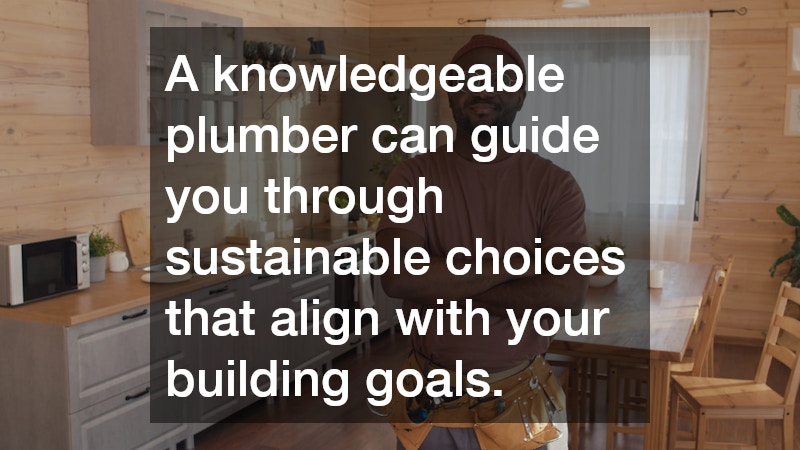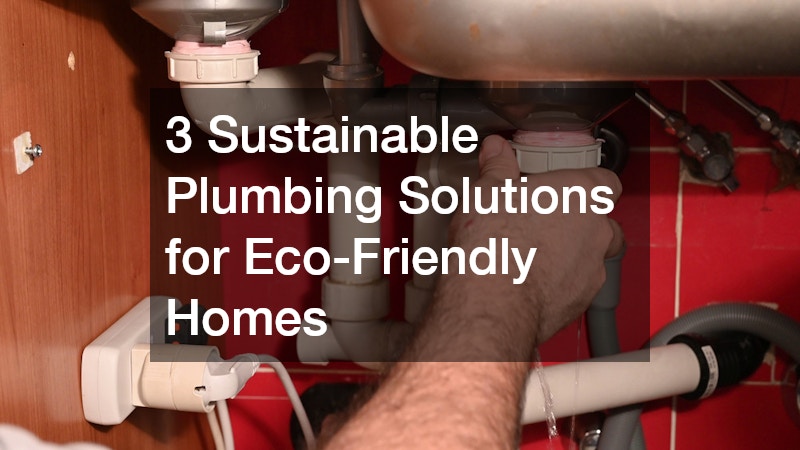Plumbing plays a bigger role in sustainability than many people realise. From water conservation to energy efficiency, the right plumbing choices can reduce your environmental footprint while saving you money on household bills. As more homeowners across Australia aim for eco-friendly living, sustainable plumbing has become a growing priority.
Eco-conscious upgrades aren’t just about new technology—they also involve smart design, efficient use of resources and long-term planning. Whether you’re building a new home or upgrading an existing one, sustainable plumbing solutions can help create a healthier and more efficient living space.
Installing water-saving fixtures
One of the simplest ways to make your plumbing more sustainable is by installing water-saving taps, showerheads and toilets. These fixtures are designed to use less water without sacrificing performance.
For example, dual-flush toilets allow you to choose a low or full flush depending on your needs, while aerated taps and low-flow showerheads reduce water usage without affecting pressure. These small changes can make a noticeable difference in daily water use and are often inexpensive to install.
Over time, water-efficient fixtures can reduce your household water bills and lower your demand on local water supplies, making them a smart choice for eco-friendly homes.
Harvesting and reusing rainwater
Rainwater harvesting systems collect water from your roof and store it in a tank for later use. This water can be used for outdoor tasks like garden irrigation or car washing and, with the right setup, even for flushing toilets or running your washing machine.
By using rainwater instead of the mains supply, you reduce your demand on treated water and make the most of a natural resource that’s often wasted. It also helps manage stormwater runoff, which can cause erosion or flooding in built-up areas.
Working with a professional ensures the plumbing is properly connected and compliant with local regulations, making your rainwater system efficient and safe to use.
Using greywater for irrigation
Greywater systems reuse lightly used water from sinks, showers and washing machines for garden irrigation. This reduces pressure on sewer systems and saves fresh water for more critical uses.
A properly installed greywater system filters and redirects this water to your garden through underground pipes or drip systems. It’s an ideal way to keep lawns and plants healthy during dry periods without relying on mains water.
Not all plumbing systems are suitable for greywater reuse, so it’s important to consult with a licensed plumber who understands how to design a system that suits your property and complies with local laws.
Choosing energy-efficient hot water systems
Heating water is one of the largest energy uses in the average Australian home. Choosing an efficient hot water system can significantly cut your energy use and reduce greenhouse gas emissions.
Solar hot water systems use the sun’s energy to heat water and are one of the most sustainable options available. Heat pump systems are another good alternative, using electricity to move heat rather than generate it directly.
While these systems often cost more upfront, they pay off over time through lower energy bills. A good plumber can assess your household needs and recommend the most efficient option based on your budget and climate.
Reducing heat loss through pipe insulation
Hot water systems lose energy when heat escapes through exposed pipes. Insulating your hot water pipes helps keep water warmer for longer, reducing the amount of energy needed to reach your desired temperature.
This small change is often overlooked but can make a real difference in energy efficiency. A licensed plumber can identify where heat loss occurs and install the right type of insulation to fix it.
It’s a low-cost improvement that works well alongside other energy-saving upgrades and helps your whole plumbing system run more efficiently.
Fixing leaks promptly
Leaks may seem minor, but over time, they waste significant amounts of water. A dripping tap or leaking toilet can add hundreds of litres to your monthly usage and lead to hidden damage behind walls or under floors.
Sustainable plumbing starts with good maintenance. Regular inspections and prompt repairs help ensure your system runs efficiently and avoids unnecessary water waste.
If you notice signs of leaks—such as damp spots, musty smells or unexplained spikes in your water bill—it’s time to call in a plumber to investigate and make the necessary fixes.
Using sustainable materials
Eco-friendly homes often use materials that are better for the environment, and that includes what’s behind the walls. When upgrading your plumbing, ask about pipes and fittings made from recyclable or low-impact materials.
Some options include PEX piping, which is flexible and has a long lifespan, or copper, which is fully recyclable and resistant to bacteria. Choosing quality materials also means fewer repairs and replacements in the long run.
A knowledgeable plumber can guide you through sustainable choices that align with your building goals and budget.
Sustainable plumbing is an essential part of any eco-friendly home. From saving water to lowering energy use, these smart solutions improve efficiency without compromising on comfort.
By working with qualified professionals and making conscious choices about fixtures, systems and materials, you can reduce your impact on the environment and enjoy the long-term benefits of a more efficient home.
Whether you’re building new or making small upgrades, every plumbing improvement counts towards a greener future.

